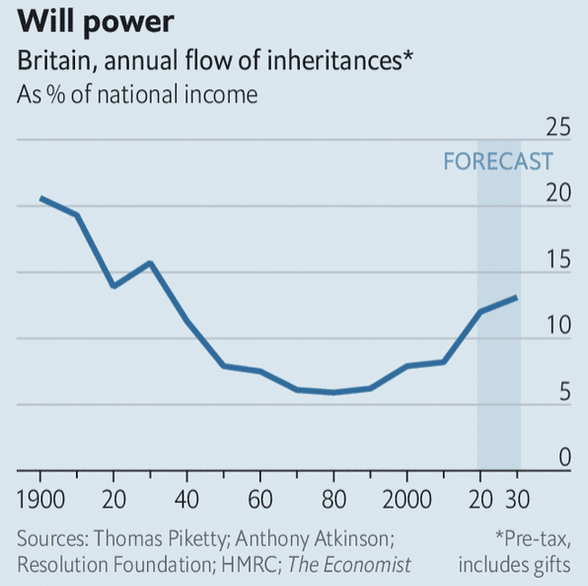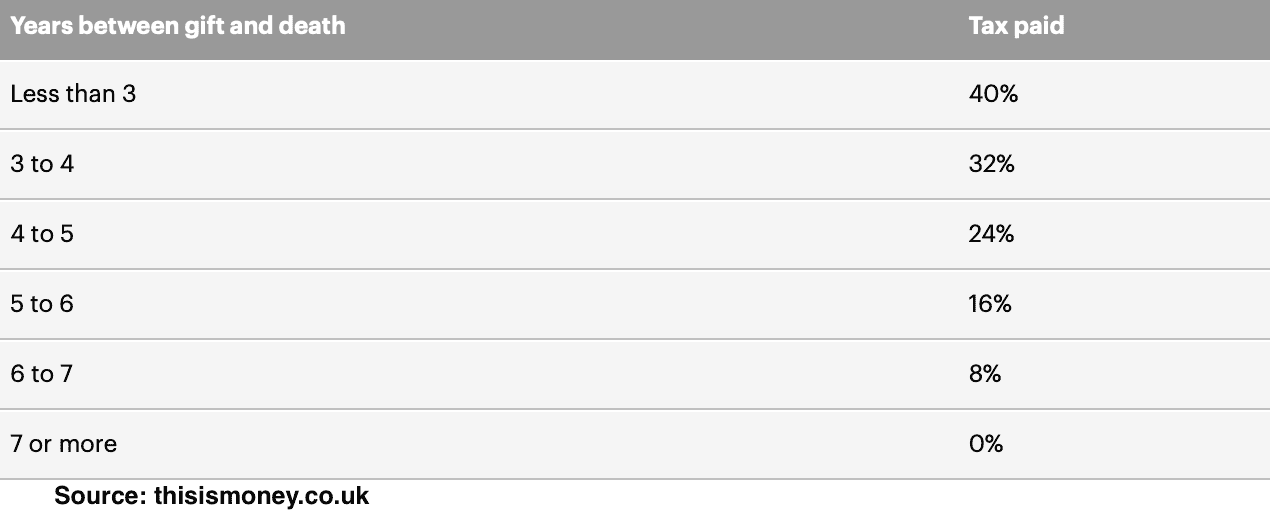How to avoid inheritance tax
Reducing your tax liability after an inheritance benefaction
Estate planning has become essential
If you want professional advice, book a call with one of our specialist financial advisors.
As baby boomers fade away, Britain is embarking on its biggest inheritance surge for almost 90 years. It’s high time to consider how to secure that wealth for the next generation.

I don’t have an inheritance tax problem
To most ordinary British people, IHT might seem of little importance. The average net wealth is about £172,000 per person compared with the current nil-rate band of £325,000, below which no tax is payable.
Married couples and those in a registered civil partnership pay nothing on what is bequeathed between them. Additionally, each can transfer their allowance to their spouse or partner, setting the NRB at £650,000 for such couples.
Each partner or spouse may also transfer £175,000 of the value of their joint main residence to direct-family heirs, including grandchildren, stepchildren, adopted children, and even foster children. That’s £350,000 per couple, taking their total tax-free bequest, under all of these circumstances, to one million pounds.
But, as they say, a million pounds ain’t what it used to be. That’s become especially true during the residential property boom of the past 40-odd years. Not only has that raised the average UK house price to £268,000, but it’s also encouraged to record activity in second homes and buy-to-lets.
Add the declining UK popularity in marriages and civil partnerships over the past 50 years and it’s easy to see how more people should be undertaking diligent estate planning.
Give it up
The simplest plan might be to give it away. If this is done seven years or more before the donor’s death, the gift is IHT-exempt. Even if you don’t survive that long, the tax is paid on a reducing scale. The longer the period between gift and death, the less tax is due.

If the estate is 100 per cent in property, or nearly so, you could consider taking a lifetime mortgage or arranging equity release, then make a gift of the cash raised. The debt also reduces inheritance tax on the retained balance of the estate. It’s a complicated solution, however, and professional advice should be sought to understand whether this is suitable for you.
Smaller gifts, up to £3,000, may be made to anyone at any time before death and up to £5,000 may be given tax-free to each child when they marry. Pension pots may also be given away tax-free, but demanding limits and conditions apply. See our related guide on pensions lifetime allowance explained.
Gifts to registered charities are wholly free of inheritance tax. If at least 10 per cent of the entire estate is donated, tax on the remainder (in excess of the NRB) drops from 40 per cent to 36 per cent.
If you’re in the happy position of having more income than needed to live in your established manner, why not give away the excess? No limits apply on either timing or amount, but there must be proof that your living standard hasn’t been affected.
I’m a loser
Do you have any investments valued below cost and therefore not liable to capital gains tax? These could include shares, funds, second homes, and buy-to-lets.
You can give them to anybody and, subject to the seven-year rule, they are free of inheritance tax. Should their value recover before you die, the recipients will be liable for CGT on any gains realised. Your will can instruct your estate to pay if a taxable sale occurs after your death.
You could also invest in assets that attract inheritance tax relief such as agricultural land, a business, or shares in unlisted companies. The relief is 50 per cent, or 100 per cent if held for two years before death. Even if it’s a listed company, 50 per cent relief applies if you hold over 50 per cent of the voting rights.
Trust in me
Some set up a trust to protect their estate. Your assets are surrendered to the trustees and you no longer own or control them. With an ‘interest in possession trust, you still receive income from the assets. Transfers into any trust remain subject to the seven-year restriction.
Trusts can reduce inheritance tax and eliminate probate delays, especially if a life insurance policy is included, but they are complicated and costly. You could end up paying even more tax.
In 1716, the writer Christopher Bullock noted that it’s “impossible to be sure of anything but death and taxes”. You cannot avoid them without breaking the rules of, respectively, either nature or man.
Nonetheless, there are two rules that will minimise their effects. The first is that, unless your estate is simple and small and your heirs are immediate family only, do not die intestate. Without a properly drafted Will, your estate not only risks paying excessive tax, but your heirs could be partially, even wholly, excluded from any benefit.
Meanwhile, in the words of the government’s own Office of Tax Simplification, IHT is: “Poorly understood, counter-intuitive . . . or simply unclear”.
The second rule is, therefore: Consult a professional adviser before making any arrangements. It won’t save your life, but it could save your fortune.
 Investment
Investment Trustee
Trustee

